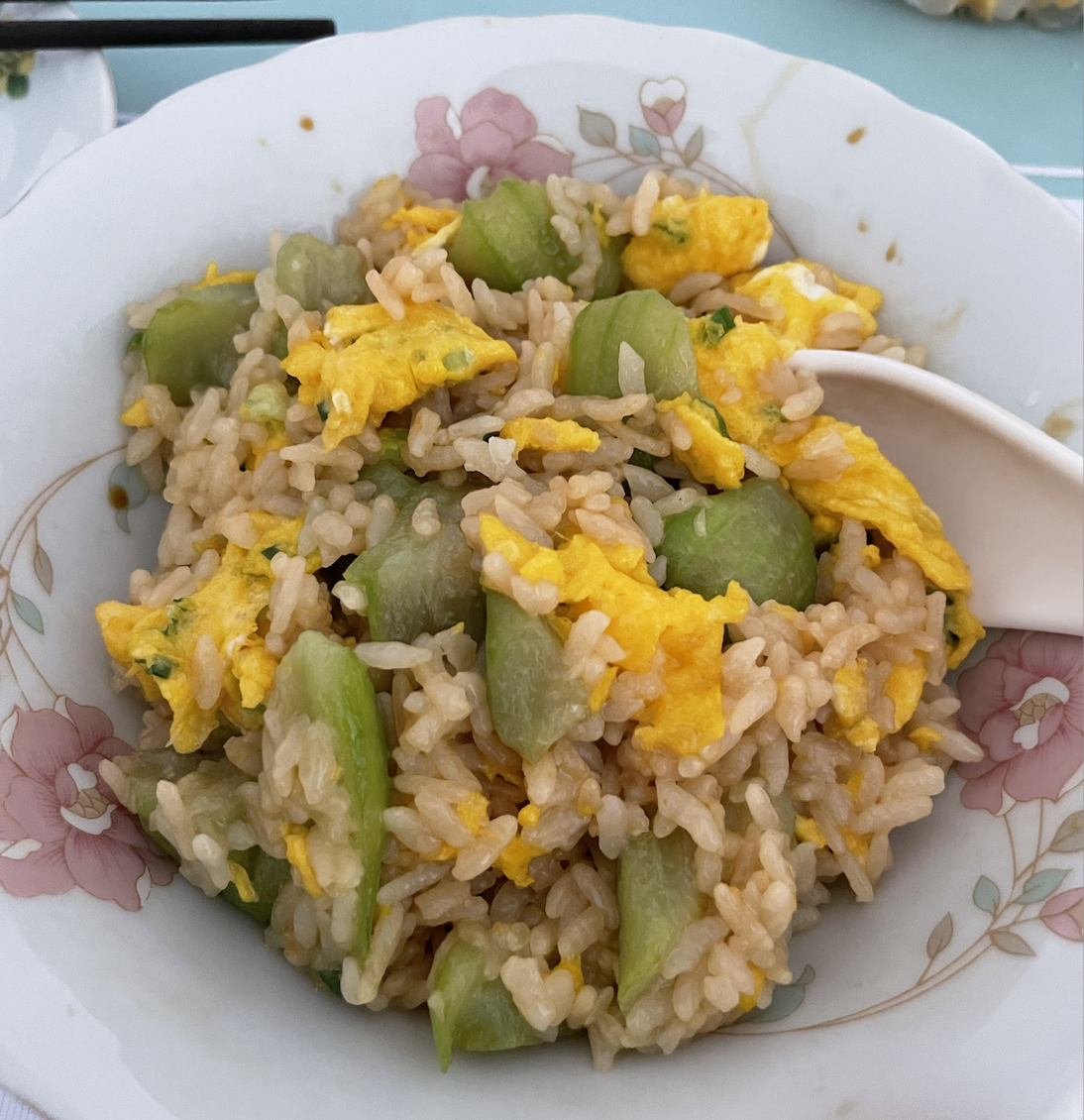Narrative with a lift: Fried Rice with Eggs
Now my voice echoes through the phone. “Don’t worry,” I said, proudly. “I can take care of myself now.”
Written by Clara Xi
Chopping. Crackling. Swishing. Sizzling. I swirled the popping oil around the pan. Then, I poured in the lightly beaten eggs. The scent felt familiar. For a second, I thought I heard cicadas—an unusual sound as the snow fell silently outside my window. The inside kitchen suddenly folded itself around me—shrinking in size as heat rose and walls tightened—until it could match my memory of a somewhere that marked the start of my cooking mastery.
Fried rice with eggs—her dish.
Back in the summers of my childhood, when the city lights merged with the cars' honks, an enthralling smell would fly into my room and steal all my attention. “吃饭啦!” she would call. I would abandon my homework, grab my tiny wooden IKEA chair, turn the channel to Garfield, and enjoy the dish on top of the tea table. The “adult conversations” about the stock market never interested me, but I did expect to hear that question.
“Does it taste good?”
“Yes!” I’d always nod with certainty.
6000 miles away from that kitchen, I am facing a new pan alone.
Will I replicate her taste?
Oil impatiently boiled. I had to rush to the refrigerator and tear out the chunk of cold rice from last night. It hissed in the pan as I breathed out in relief. No fire alarms were evoked. No eggs were burned.
My grandma used to always say, “You have to add enough oil to make the rice taste right,” —a comment usually followed by my mom’s scolding. But between them, I always believed my grandma, for she has always been the one cooking, also the one teaching me how not to fear the splashing oils.
Unlike Western dishes, whose name summarizes the ingredients, Chinese dishes often extend beyond their names. “Fried rice with eggs” could consist of any leftovers in the fridge.
Today, for me, eggplant is on the list.
The eggplant was already drenched in sauce from last night’s takeout from Emperor’s Garden, but I still pulled out all kinds of different bottles—soy sauce, sukiyaki sauce, 沙茶sauce, oyster…But I noticed one without a label. I twisted it open. Though the scent was faint, I recognized it.
It was her sauce.
Weeks before I left for the US, my grandma’s wrinkled hands were resting on mine in that small, heated kitchen, teaching me how much of that sauce is “just enough” to “give the dish a color”. I never knew how she measured it, as nothing was to scale. But now, I trust my instinct.
An apprentice of her cuisine, I added the eggs, stirred fully, and chopped some scallions for a touch of green on the dish; it was ready. Ignoring the messy kitchen tables, I took a picture of the combination of green scallion, purple eggplant, slightly brown rice, and golden eggs; and scooped a big spoonful into my mouth.
Oil on the rice melted on the tip of my tongue. Slightly salty, creamy eggs lingered between my teeth. The firm but spongy texture of the eggplant merged with its savory taste, the sweet rice following, with a final touch of fragrant scallion. Each ingredient tasted different, yet together, they tasted fascinating—just like hers.
“Hey,” I whispered, “your granddaughter didn’t let you down.”
I am too tall to sit in that IKEA chair now, so I moved to the grown-up table, joined the conversation about stocks that replaced the cartoons. Outside, the snow muffled the voices from my distant memories—it’s just another long, lonely winter upstate. Weariness, distance, and exhaustion replaced the cicadas and car honks.
Back home, I imagine her kitchen without me: the AC off to save money, sweat on her forehead, smile when hearing my successes, gentle hum of the songs she’s learning at the elderly choir, her asking me, “Are you eating well?” when chopping scallions over phone calls. Those sounds were once all covered up in the smoke of my vague memories—until now, revived from steam and taste that will carry me through another winter.
Food carried her love across the ocean—bursting like hope, soothing like childhood, on the tip of my heart. She must have stuck the sauce into my overloaded baggage in the airport, for she knew, as always, that I would miss Chinese cuisine.
My eyes fogged from perhaps, steam. A familiar taste lingered on the tip of my tongue. The magical power of food made me travel back in time—just that kid, believing in her dreams, struggling to grow up: also always awaiting her grandma’s dish. She has always been inside of me, and will always be part of me.
Now my voice echoes through the phone. “Don’t worry,” I said, proudly.
“I can take care of myself now.”
-
Add a short summary or a list of helpful resources here.

